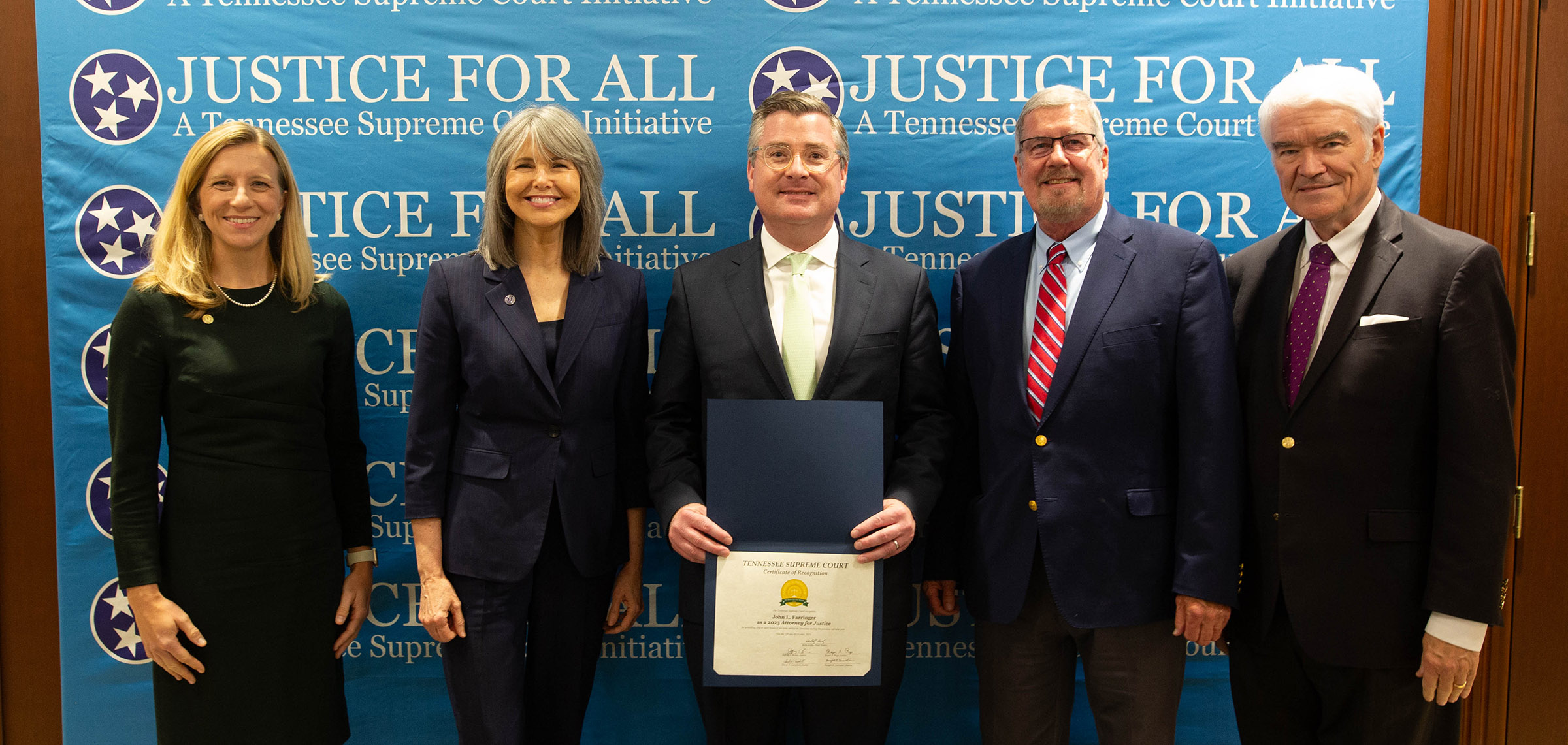
The Tennessee Supreme Court and the Access to Justice Commission recently celebrated attorneys who performed more than 50 hours of pro bono services over the course of a year.
“Tennessee's always been the volunteer state and the lawyers live up to that motto,” John Farringer, chair of the Supreme Court Access to Justice Commission, said. “In 2021, Tennessee lawyers performed 585,571 hours of pro bono work valued at $125.9 million worth of legal services.”
“Tennessee's always been the volunteer state and the lawyers live up to that motto,” John Farringer, chair of the Supreme Court Access to Justice Commission, said. “In 2021, Tennessee lawyers performed 585,571 hours of pro bono work valued at $125.9 million worth of legal services.”
Just over half of all licensed attorneys reported providing pro bono legal services. On average, attorneys performed 63.4 hours of pro bono work. Most pro bono work is performed on behalf of Tennesseans of limited means who have a civil legal issue, including housing, employment, orders of protection, child custody or other non-criminal concern.
Recognizing that thousands of Tennesseans struggle with civil law issues and even try to represent themselves before court, the Tennessee Supreme Court made access to justice its number one strategic priority and formally announced its Access to Justice Initiative in December 2008. One of the main goals of the initiative was to cross the threshold of at least 50 percent of attorneys providing pro bono work each year, a goal that was met several years ago.
Texas Supreme Court Chief Justice Nathan Hecht was the keynote speaker for the event. Texas is often considered the “gold standard” in access to justice with robust legal aid and pro bono programs.
- Texas Chief Justice Nathan Hecht“Justice for the poor is often not a promise but a taunt. We require a ticket to enter the courthouse, payable in attorney fees far beyond the reach of hundreds of thousands of people every year.”

“Justice for the poor is often not a promise but a taunt. We require a ticket to enter the courthouse, payable in attorney fees far beyond the reach of hundreds of thousands of people every year,” Chief Justice Hecht said. “Pro bono legal service and public funded legal aid are critically important in restoring public confidence in the justice system. Legal aid is about changing lives, the value of which cannot be quantified.”
Across the state, several legal aid organizations provide free civil legal representation. However, the budgets of these organizations are strained and there are restrictions on the services they can provide. Volunteer private practice attorneys fill in the gap.
“Our tradition of providing legal services to those who cannot afford them is not merely necessary. It is compassionate, it is patriotic, it is nonpartisan, it instills public confidence in the justice system and the rule of law,” Chief Justice Hecht said.

Attorneys provide pro bono service to victims of domestic violence, persons with disabilities, students, the elderly, rural residents, single parents, immigrants, minorities, juveniles and homeless individuals.
“The pro bono work done in our state runs the gamut and we so appreciate the work that you do as we get closer to access to justice for all,” Tennessee Supreme Court Justice Jeff Bivins said. Justice Bivins is the Supreme Court’s liaison to the Access to Justice Commission. “The reward is not just the victory for a client, it's the ability to help. It's the ability to be of service and it's the ability to truly help our state and our protected citizenry and provide that access to justice.”

In Tennessee, there are many opportunities for attorneys to provide pro bono services. The justiceforalltn.org website has listings of clinics and other events in need of volunteer attorneys. If in-person work is not appealing, attorneys can all volunteer for Tennessee Legal Answers, which are online.
The Access to Justice Commission is an initiative of the Tennessee Supreme Court. Its mission is to provide collaborative leadership to create solutions and resources that address and eliminate access to justice for all. For more information, go to http://www.tncourts.gov/programs/access-justice or email ATJInfo@tncourts.gov.



